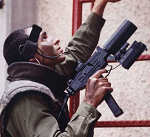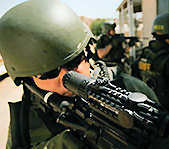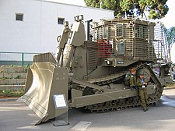 U.S. District Court Judge Inge P. Johnson, after a seven day bench trial, recently dismissed six felony charges against Alexander Latifi, a defense contractor from Huntsville, Alabama. The judge ruled that the prosecution failed to carry its burden of proof. Based on news accounts of the decision, it is likely that the judge’s decision was swayed by the revelation that the prosecution’s chief witness, a former employee of Latifi named Elizabeth Lemay, pleaded guilty to embezzling money from Latifi and admitted on the stand that before she left Latifi’s company she sabotaged company computers and destroyed the purchase order system.
U.S. District Court Judge Inge P. Johnson, after a seven day bench trial, recently dismissed six felony charges against Alexander Latifi, a defense contractor from Huntsville, Alabama. The judge ruled that the prosecution failed to carry its burden of proof. Based on news accounts of the decision, it is likely that the judge’s decision was swayed by the revelation that the prosecution’s chief witness, a former employee of Latifi named Elizabeth Lemay, pleaded guilty to embezzling money from Latifi and admitted on the stand that before she left Latifi’s company she sabotaged company computers and destroyed the purchase order system.
Latifi’s company Axion had been awarded a contract by Sikorsky to produce a bifilar weight assembly which is used in a rotor in the steering system of the UH-60 Blackhawk helicopter. According to a report in the Huntsville News, Lemay testified that Lafiti needed to find a supplier for tungsten used in the weight assembly.
Eventually, Latifi contacted a man in California named Ming Hwong, the representative of a Chinese tungsten supplier, ECO-Tungsten, Lemay testified. Latifi and Ming Hwong traded numerous correspondence by e-mail and telephone, she said.
Then, an ECO-Tungsten representative named Ding Dong, entered the picture via e-mail and by telephone, Lemay testified. Eventually, Latifi ordered her to send technical drawings of the bifilar weight assembly to Ding Dong at ECO-Tungsten in China.
The defense claimed that Latifi never directed Lemay to send the drawings at issue and sought to impeach her testimony:
Latifi’s lawyer, Henry Froshin of Birmingham, engaged Lemay in a heated cross-examination about why she was lying about his client.
“Were you trying to cover up your own forgery and theft?” he asked.
“No,” she said.
According to Froshin and court records, Lemay pleaded guilty in 2005 to forging 15 Axion company checks totaling $12,730. Latifi fired Lemay on February 2004. A Madison County judge suspended a three-year prison sentence and placed her on probation for four years.
While she was stealing Axion’s money, Lemay was feeding information to federal agents, Froshin said.
She admitted that she did not tell federal agents about the theft. She also said she neglected to tell the grand jury.
And with those admissions I think we can safely say that Lemay and the prosecution’s case crashed and burned.
Defense counsel also told the Huntsville News that they opted for a bench trial rather than a jury trial because Latifi was born in Iran and, given the current state of relations between the United States and Iran, might not be favorably viewed by a jury.
 Seyed Mostafa Maghloubi, an American citizen of Iranian origin, was sentenced today to three years and five months in connection with his attempt to export night vision goggles and up to 10,000 Uzis to Iranian government officials opposed to the current regime of current President Mahmoud Ahmadinejad. Maghloubi previously pleaded guilty to this offense in August 2007. Maghloubi had been apprehended in a sting operation during which a Los Angeles detective pretended to be an arms dealer.
Seyed Mostafa Maghloubi, an American citizen of Iranian origin, was sentenced today to three years and five months in connection with his attempt to export night vision goggles and up to 10,000 Uzis to Iranian government officials opposed to the current regime of current President Mahmoud Ahmadinejad. Maghloubi previously pleaded guilty to this offense in August 2007. Maghloubi had been apprehended in a sting operation during which a Los Angeles detective pretended to be an arms dealer.
 Posted by
Posted by  Category:
Category: 


 U.S. District Court Judge Inge P. Johnson, after a seven day bench trial, recently
U.S. District Court Judge Inge P. Johnson, after a seven day bench trial, recently  A friend of mine, a former policeman who now sits on the U.S. Court of Appeals for the Ninth Circuit, used to say that the easiest thing about being a cop was that most criminals are really, really stupid. Case in point:
A friend of mine, a former policeman who now sits on the U.S. Court of Appeals for the Ninth Circuit, used to say that the easiest thing about being a cop was that most criminals are really, really stupid. Case in point:  Yesterday the U.S. Court of Appeals for the Ninth Circuit
Yesterday the U.S. Court of Appeals for the Ninth Circuit 

